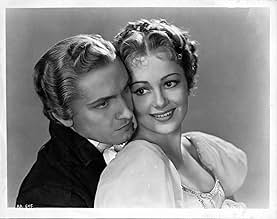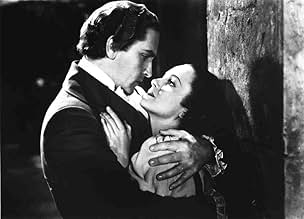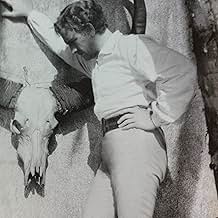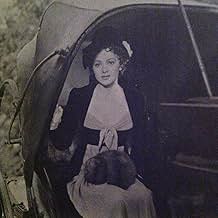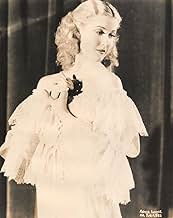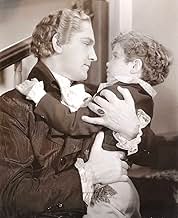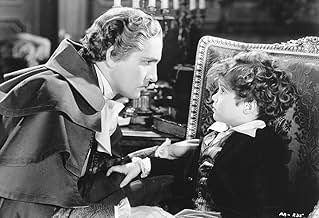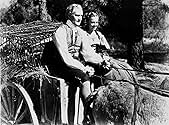IMDb रेटिंग
6.3/10
2.1 हज़ार
आपकी रेटिंग
अपनी भाषा में प्लॉट जोड़ेंIn 18th-century Italy, an orphan's debt to the man who raised him threatens to separate him forever from the woman he loves.In 18th-century Italy, an orphan's debt to the man who raised him threatens to separate him forever from the woman he loves.In 18th-century Italy, an orphan's debt to the man who raised him threatens to separate him forever from the woman he loves.
- 4 ऑस्कर जीते
- 8 जीत और कुल 3 नामांकन
फ़ीचर्ड समीक्षाएं
Today both Hervey Allen and his novel, Anthony Adverse, are all but forgotten, as is the 1936 Mervyn Leroy adaptation. Allen has never been granted a biography or a critical study( one could also say the same thing about Mervyn Leroy) while both the novel and the film are dismissed as over blown, prolix "white elephants". This is not entirely fair. Allens 1200 page colossus was the greatest best seller of its day, and was only surpassed when Margaret Mitchell wrote Gone With The Wind, while Leroys film isn't bad. In fact it is pretty good, in its own way. First of all, Leroy managed to condense Allens erudite, baroque epic into the space of a two -hour, black and white film. In doing so, he managed to retain most of the novels elaborate religious symbolism( Allen seems to have been either a Lapsed, but still affectionate Catholic or an Episcopalian of the "high church " variety with a fascination with Priests, The Virgin Mary, and Crucifixion symbols), all of the colorful characters( Allen seems to have ransacked Tolstoy, Dickens, Dumas, and Balzac for ideas.), and most of the action.( the carriage chase in the Alps is one of the great "scenes" of thirties cinema). The film has also retained the novels plot, or most of it. One would not know, for example, that the hero ends up dying rather UNheroically in Texas sometime in the early eighteen twenties, or that the book has a truly bizarre, ambiguous epilogue in which "white trash" settlers of Texas from Missouri stumble across the statuette of the virgin and the ruins of Adverses estate.The great problem with the book -and with the film- is that Anthony Adverse is NOT a heroic figure. He is played upon, not player, a passive, frequently humiliated victim of adversity. Clearly, Allen wanted to make him a philosophical hero, not a swashbuckler. He is a clerk, for heavens sake. Most of the time, he is engaged in capitalist transactions of some sort, instead of sword-play. ( indeed, the only sword- play in the movie is between the villainous Don Luis and Anthony's father.)The basic action is simple. One Priest gives Anthony a mind,by teaching him. Another gives him a soul, by reminding him that slavery is a sin( Incidentally, the film is a powerful indictment of slavery and racism). Finally, Olivia De Havillands character gives him a heart, by introducing him to the son he never knew he had. March-a very fine actor at his best- seems curiously flat and passive in the role of Adverse. The truly great performances are by Claude Rains and Gale Sondergaard as the over the top super-villains. Rains exhudes decadence, arrogance and sadism, while Sondergaard won the first best supporting actress Oscar, simply by grinning satanically for two hours.
Fredric March stars as the title character, an orphan boy discarded due to his illegitimacy, who overcomes much adversity throughout his life. He is raised in a convent and adopted by a wealthy merchant, Edmund Gwenn, at the age of ten. He learns the business, but is shipped to Havana around the time of the French Revolution. Before he departs, it is learned that he has married the daughter of a servant, Olivia DeHavilland. He is thought lost at sea by all, but is actually in Africa running a slave trade, with his heart blackening the whole time. From there, the tale takes many twists as Anthony must find goodness in his heart again, and DeHavilland may be the key. The drama is a bit heavy-handed and some overacting is present. Claude Rains and Gale Sondergaard make great antagonists, and Sondergaard won a Best Supporting Actress Oscar for her performance.
Hervey Allen's great blockbuster novel Anthony Adverse, a major seller during the Depression Years provided both its leads, Fredric March and Olivia DeHavilland with some choice roles in their respective careers. The book turned out to be a one hit wonder for its author, but it certainly allowed him to live comfortably. Something like that other blockbuster novel Gone With the Wind did for its author which also gave Olivia DeHavilland an even bigger role in her career.
Imagine if you will a Charles Dickens hero like Pip or David Copperfield born in very humble circumstances, but escaping to lead a life of high adventure away from the Dickensian settings of Victorian Great Britain and you've got Anthony Adverse. The supporting characters in the book and film could have also come from Dickens.
Young Anthony is the product of an affair between a young officer, Louis Hayward, and the wife of a Spanish diplomat, Anita Louise. Husband Claude Rains kills Hayward in a duel and when his wife dies in childbirth, leaves the infant at a convent. The nuns give him the name of Anthony Adverse as the boy arrives on St. Anthony's Day and is a child of adversity if there ever was one.
The grown up Anthony, played by Fredric March is apprenticed to his maternal grandfather Edmund Gwenn who does not know it as doesn't March at first. A sly and cunning housekeeper, Gale Sondergaard in her screen debut, puts the puzzle together, but she's got an agenda of her own which later meshes with the dissipated and dissolute Rains.
March also falls for young Olivia DeHavilland who is an aspiring opera singer who also wants some of the finer things in life. Though they marry and have a son, both take different paths on a quest for material security and comfort.
Anthony Adverse was a good follow up role for Olivia DeHavilland after Captain Blood. In both she's a crinolined heroine which she was destined to be cast as in her career at Warner Brothers. Still this part has a lot more to it than most of those she was doing at that time in her career.
March was 39 when he made Anthony Adverse, still he's a good enough player to gradually age into the part. The story does take place over a long period of years, right into the Napoleonic era from 1773 when Anthony is born.
Edmund Gwenn's character is pure Dickens, the Scot's merchant John Bonnyfeather (even the name) could easily have been Fezziwick from A Christmas Carol. Gale Sondergaard as the housekeeper could have been the bloodless Jane Murdstone combined with the vengeful Madame DeFarge.
Sondergaard won the first Best Supporting Actress Oscar given out for her performance. It set a pattern of villainous female roles which she played until she got blacklist troubles in the late Forties.
The novel was a lengthy one and Warner Brothers should have had something as long as Gone With the Wind in order to be really faithful to the book. Jack Warner didn't want to take a chance, but he did get a product that caught all the main points the author was trying to make.
Even today with it's magnificent Erich Wolfgang Korngold score which also won an Oscar and its photography by Tony Gaudio, also a winner Anthony Adverse holds up very well for today's audience. Fans of March and DeHavilland should love it as will others.
Imagine if you will a Charles Dickens hero like Pip or David Copperfield born in very humble circumstances, but escaping to lead a life of high adventure away from the Dickensian settings of Victorian Great Britain and you've got Anthony Adverse. The supporting characters in the book and film could have also come from Dickens.
Young Anthony is the product of an affair between a young officer, Louis Hayward, and the wife of a Spanish diplomat, Anita Louise. Husband Claude Rains kills Hayward in a duel and when his wife dies in childbirth, leaves the infant at a convent. The nuns give him the name of Anthony Adverse as the boy arrives on St. Anthony's Day and is a child of adversity if there ever was one.
The grown up Anthony, played by Fredric March is apprenticed to his maternal grandfather Edmund Gwenn who does not know it as doesn't March at first. A sly and cunning housekeeper, Gale Sondergaard in her screen debut, puts the puzzle together, but she's got an agenda of her own which later meshes with the dissipated and dissolute Rains.
March also falls for young Olivia DeHavilland who is an aspiring opera singer who also wants some of the finer things in life. Though they marry and have a son, both take different paths on a quest for material security and comfort.
Anthony Adverse was a good follow up role for Olivia DeHavilland after Captain Blood. In both she's a crinolined heroine which she was destined to be cast as in her career at Warner Brothers. Still this part has a lot more to it than most of those she was doing at that time in her career.
March was 39 when he made Anthony Adverse, still he's a good enough player to gradually age into the part. The story does take place over a long period of years, right into the Napoleonic era from 1773 when Anthony is born.
Edmund Gwenn's character is pure Dickens, the Scot's merchant John Bonnyfeather (even the name) could easily have been Fezziwick from A Christmas Carol. Gale Sondergaard as the housekeeper could have been the bloodless Jane Murdstone combined with the vengeful Madame DeFarge.
Sondergaard won the first Best Supporting Actress Oscar given out for her performance. It set a pattern of villainous female roles which she played until she got blacklist troubles in the late Forties.
The novel was a lengthy one and Warner Brothers should have had something as long as Gone With the Wind in order to be really faithful to the book. Jack Warner didn't want to take a chance, but he did get a product that caught all the main points the author was trying to make.
Even today with it's magnificent Erich Wolfgang Korngold score which also won an Oscar and its photography by Tony Gaudio, also a winner Anthony Adverse holds up very well for today's audience. Fans of March and DeHavilland should love it as will others.
I just watched the Warner Archive DVD-R of this movie last night. I want to say that it is a good movie and much underrated by the IMDb score of 6.6. It deserves at least a 7.6; I give it an 8.
It is beautifully filmed, the sets are gorgeous, and the cast of actors is stellar and does a good job with the material. Even the players with smaller roles are well-known actors, and they deliver their short moments with just the right emphasis. If you're an old film fan, you can't watch the movie without seeing a score of faces that you know and love.
The two main complaints I see here are that Fredric March is too old to play a convincing lover for De Havilland, and that the movie is somewhat pedestrian and dragging.
On the first point, yes, in some scenes the age difference in visible, but in others, March is made up to look younger than his biological age, and is convincing as a younger man. But the key thing is that March is *good* in the role. If you overlook the physical signs of his age, and concentrate on his characterization, delivery, etc., you can see he is acting thoughtfully, trying to do justice to his complex character. I think it's an excellent performance.
Pedestrian and dragged-out? Well, the film is long, as these epic-type films tend to be. Yet I did not find that my interest flagged. The film deals with years of the lives of these characters, and it needs to be long to get in all the complex background of European history and the changes in the lives of the characters (not to mention the important back-story of Anthony's birth).
One more thing: some commenters thought that Gale Sondergaard did little to earn her Oscar for this one. I thought she was very good. Normally she plays the sinister villainess in a very broad manner that telegraphs how evil and sinister she is; in fact, she was often hired because she was so good at that kind of thing (see her many Universal horror and mystery films). Here, she shows a bit of that sinister character, but underplays it greatly, to very good effect. She would never have earned an Oscar had she played the role in her heavy Universal style. I think it's the subtlest performance I've seen her give.
The sound on the Archives DVD-R is at first a tiny bit harsh, especially the booming orchestra with the grand Korngold score; this I noticed especially near the beginning of the film, and was worried it would spoil the film for me. However, the sound seemed to become a bit gentler about 10 or 15 minutes into the movie -- or maybe I just got used to it. But the volume of characters's speeches was definitely a bit uneven in the first few minutes. That happens, with movies this old. Perfect prints are rare, and DVDs reflect the imperfections. Overall, however, the DVD was quite watchable and the audio was clear and adequate.
I recommend this as a historical epic. Not one the greatest epics, to be sure, but quite a good one, and admirably executed. Maybe not a must-see, but certainly nothing you will regret seeing. I will watch it more than once, I think.
It is beautifully filmed, the sets are gorgeous, and the cast of actors is stellar and does a good job with the material. Even the players with smaller roles are well-known actors, and they deliver their short moments with just the right emphasis. If you're an old film fan, you can't watch the movie without seeing a score of faces that you know and love.
The two main complaints I see here are that Fredric March is too old to play a convincing lover for De Havilland, and that the movie is somewhat pedestrian and dragging.
On the first point, yes, in some scenes the age difference in visible, but in others, March is made up to look younger than his biological age, and is convincing as a younger man. But the key thing is that March is *good* in the role. If you overlook the physical signs of his age, and concentrate on his characterization, delivery, etc., you can see he is acting thoughtfully, trying to do justice to his complex character. I think it's an excellent performance.
Pedestrian and dragged-out? Well, the film is long, as these epic-type films tend to be. Yet I did not find that my interest flagged. The film deals with years of the lives of these characters, and it needs to be long to get in all the complex background of European history and the changes in the lives of the characters (not to mention the important back-story of Anthony's birth).
One more thing: some commenters thought that Gale Sondergaard did little to earn her Oscar for this one. I thought she was very good. Normally she plays the sinister villainess in a very broad manner that telegraphs how evil and sinister she is; in fact, she was often hired because she was so good at that kind of thing (see her many Universal horror and mystery films). Here, she shows a bit of that sinister character, but underplays it greatly, to very good effect. She would never have earned an Oscar had she played the role in her heavy Universal style. I think it's the subtlest performance I've seen her give.
The sound on the Archives DVD-R is at first a tiny bit harsh, especially the booming orchestra with the grand Korngold score; this I noticed especially near the beginning of the film, and was worried it would spoil the film for me. However, the sound seemed to become a bit gentler about 10 or 15 minutes into the movie -- or maybe I just got used to it. But the volume of characters's speeches was definitely a bit uneven in the first few minutes. That happens, with movies this old. Perfect prints are rare, and DVDs reflect the imperfections. Overall, however, the DVD was quite watchable and the audio was clear and adequate.
I recommend this as a historical epic. Not one the greatest epics, to be sure, but quite a good one, and admirably executed. Maybe not a must-see, but certainly nothing you will regret seeing. I will watch it more than once, I think.
I have not read the largely forgotten book on which this movie is based.
My favorite films are from the early 30's to the mid 40's. The cast in this film is stellar, including some of my favorite leads and supporting actors. I love costume dramas and adventures set in exotic places. However, with all of those factors to prejudice me in favor of Anthony Adverse, I was hugely disappointed.
The plot seems okay. The sets and costumes are excellent. The cast, as I already mentioned, is stellar (in the credits!). The score seems appropriate. The expensive production shows throughout. The reason this film is so unsatisfying is rather puzzling. I think it may be one of those times everybody from the director on down was simply going through the motions. Hard to believe, given the cast. But they all seem so - not just two-dimensional, but - lifeless. Perhaps, as one other reviewer suggests, this film would have been better if de Havilland had been teamed with Errol Flynn instead of Frederic March. I don't remember seeing Flynn ever give a less than energetic performance.
Frederic March, one of America's greats, fails to create a character that I could like, sympathize with or root for with any enthusiasm. In fact enthusiasm is what he seems to lack in this role. Olivia de Havilland is somewhat better, but this is one of her least impressive performances. Gale Sondergaard did very little to receive an academy award. The appearances of Louis Heyward and Anita Louise are entirely too short. I like both, and I would have liked more of them and less of March and de Havilland. Perhaps they should have reversed roles...
Edmund Gwenn delivers a typically endearing performance in a typical Edmund Gwenn role. Henry O'Neill is usually very interesting, because he plays both sides of the fence - both good and bad guys. Here, his father Xavier is far more enjoyable than Pedro De Cordoba's Father Francoise.
The only bright spot in this under-achieving ensemble is Claude Rains. He, too, plays both good and bad guys. Here he is an aristocratic charmer and schemer - despicable and deceitful. He is great! In the scene where he laughs demonically, he sends a chill up my spine. Thank you, Mr. Rains, for delivering a great, under-appreciated performance, in an otherwise deservedly forgotten film.
At film's end, I felt like I had read a 1200 page novel - and simultaneously like I had no interest in reading THIS one.
My favorite films are from the early 30's to the mid 40's. The cast in this film is stellar, including some of my favorite leads and supporting actors. I love costume dramas and adventures set in exotic places. However, with all of those factors to prejudice me in favor of Anthony Adverse, I was hugely disappointed.
The plot seems okay. The sets and costumes are excellent. The cast, as I already mentioned, is stellar (in the credits!). The score seems appropriate. The expensive production shows throughout. The reason this film is so unsatisfying is rather puzzling. I think it may be one of those times everybody from the director on down was simply going through the motions. Hard to believe, given the cast. But they all seem so - not just two-dimensional, but - lifeless. Perhaps, as one other reviewer suggests, this film would have been better if de Havilland had been teamed with Errol Flynn instead of Frederic March. I don't remember seeing Flynn ever give a less than energetic performance.
Frederic March, one of America's greats, fails to create a character that I could like, sympathize with or root for with any enthusiasm. In fact enthusiasm is what he seems to lack in this role. Olivia de Havilland is somewhat better, but this is one of her least impressive performances. Gale Sondergaard did very little to receive an academy award. The appearances of Louis Heyward and Anita Louise are entirely too short. I like both, and I would have liked more of them and less of March and de Havilland. Perhaps they should have reversed roles...
Edmund Gwenn delivers a typically endearing performance in a typical Edmund Gwenn role. Henry O'Neill is usually very interesting, because he plays both sides of the fence - both good and bad guys. Here, his father Xavier is far more enjoyable than Pedro De Cordoba's Father Francoise.
The only bright spot in this under-achieving ensemble is Claude Rains. He, too, plays both good and bad guys. Here he is an aristocratic charmer and schemer - despicable and deceitful. He is great! In the scene where he laughs demonically, he sends a chill up my spine. Thank you, Mr. Rains, for delivering a great, under-appreciated performance, in an otherwise deservedly forgotten film.
At film's end, I felt like I had read a 1200 page novel - and simultaneously like I had no interest in reading THIS one.
क्या आपको पता है
- ट्रिवियाGale Sondergaard made her film debut in "Anthony Adverse" and won an Academy Award in the brand-new category of Best Supporting Actress.
- गूफ़During the duel between Don Luis and Denis Moore, the sword wielded by Moore was "unbated", i.e. his fencing foil was blunted with a protective guard on the tip.
- भाव
[first title card]
Title Card: Those who are destined to live during times of war and social upheaval are victims of cruel fate ~~ unable to find comfort in the past or peace in the present. They are the spiritual orphans of the world.
- कनेक्शनFeatured in The Making of a Great Motion Picture (1936)
- साउंडट्रैकI'll Wait For You My Love (Angela's Song)
(uncredited)
Composer: Erich Wolfgang Korngold
Lyrics by Howard Koch (uncredited)
Sung by Carol Ellis (uncredited)
टॉप पसंद
रेटिंग देने के लिए साइन-इन करें और वैयक्तिकृत सुझावों के लिए वॉचलिस्ट करें
- How long is Anthony Adverse?Alexa द्वारा संचालित
विवरण
- रिलीज़ की तारीख़
- कंट्री ऑफ़ ओरिजिन
- भाषाएं
- इस रूप में भी जाना जाता है
- Antonio Adverzo
- फ़िल्माने की जगहें
- उत्पादन कंपनी
- IMDbPro पर और कंपनी क्रेडिट देखें
बॉक्स ऑफ़िस
- बजट
- $10,50,500(अनुमानित)
- चलने की अवधि2 घंटे 21 मिनट
- रंग
- ध्वनि मिश्रण
- पक्ष अनुपात
- 1.37 : 1
इस पेज में योगदान दें
किसी बदलाव का सुझाव दें या अनुपलब्ध कॉन्टेंट जोड़ें



